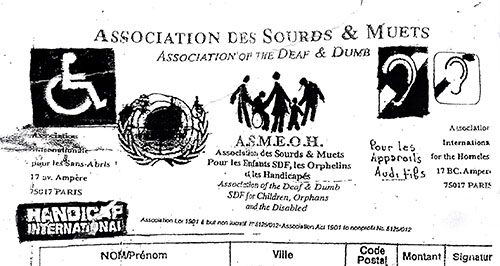As wonderful and full of joie de vivre as Paris is, as with any city frequented by millions of tourists, there is a darker side – one of people whose sole aim is to relieve unsuspecting visitors of their cash. These scams, while usually nonviolent, are nevertheless deeply irritating, and for some, intensely distressing.
Most tourists know to keep their wallets and cell phones out of their back pockets, to keep their purses fastened, and to wear their backpacks on the front of their bodies, particularly in crowded places but they’re not always as on the ball when it comes to other cons.
In this week’s post, we’ll be covering the most prevalent of the minor scams – the ones where you’re only likely to be fleeced a few Euros.
Donations
Around the main tourist areas, you’ll often see people – usually attractive young women or teenage kids – with clipboards, approaching folk as they go about their daily business. Usually this is a scam, designed to get unsuspecting tourists to sign a ‘donations’ form and contribute some money. The scammers fill out the first few lines of the form with other international-looking names, zip codes, and donation amounts in a bid to get you to follow suit. Seems easy enough to not be taken in by, right? Well, while you have been trying to explain to the person who is claiming to be a deaf mute, or collecting for handicapped children, or any one of the myriad associations that appear in the header of the badly photocopied ‘form’ that you don’t understand them, or that you don’t have any change, their partner in crime may well have been picking your pocket. This is not always the case, however – sometimes they simply will be just asking for a ‘donation’ (not that it makes it OK). Our advice is to steer clear, and don’t even begin to engage with any of them.
Bracelets
At the bottom of the funicular by Sacré CÅ“ur, you’re likely to see young guys hanging around, chatting to women – they don’t seem to approach men. If you encourage them – and by encourage, we mean, merely make eye contact – they will approach you, be flatteringly chatty and flirty, and before you know it, will have grabbed your hand, and tried to weave a length of string into friendship bracelet on your wrist, or a ring on your finger. They will of course, then demand money for this ‘gift’ – in some cases, becoming loud and aggressive if you refuse. As with the petition people, just say no, and walk away.
English?
If you’ve done your homework, you’ll know that French people will not just randomly stop you in the street to ask whether you speak English or not. Why would they? If they were to do something like that, they’d be asking whether you speak French, surely? So if a stranger comes up to you and asks if you speak English, just shrug your shoulders and make out you don’t understand them because if you do admit that you do parlez l’anglais, you’re likely to be drawn into a conversation which starts with, “I lost my walletâ€, and ends with, “Please give me moneyâ€. Remember the scene in the Great Escape, where McDonald is caught because he responds to the German officer wishing him good luck in English? That. Don’t even say ‘no’ to these people, just walk on by.
We’d like to point out that we’ve found in almost all cases, that it’s migrants who for whatever reason, appear to be unable to make a living legally in Paris, and so resort to these scams. We’re not saying that Parisians don’t indulge in such things, just that we’ve not found it to be the case.
Next week we’ll be talking about the more serious side of Paris’ con-artists.
